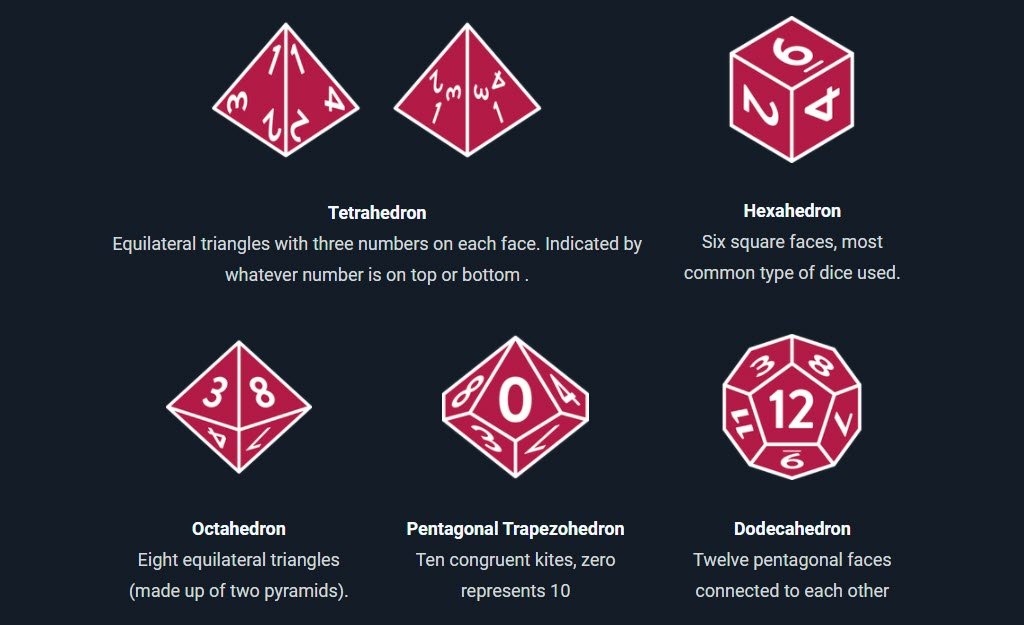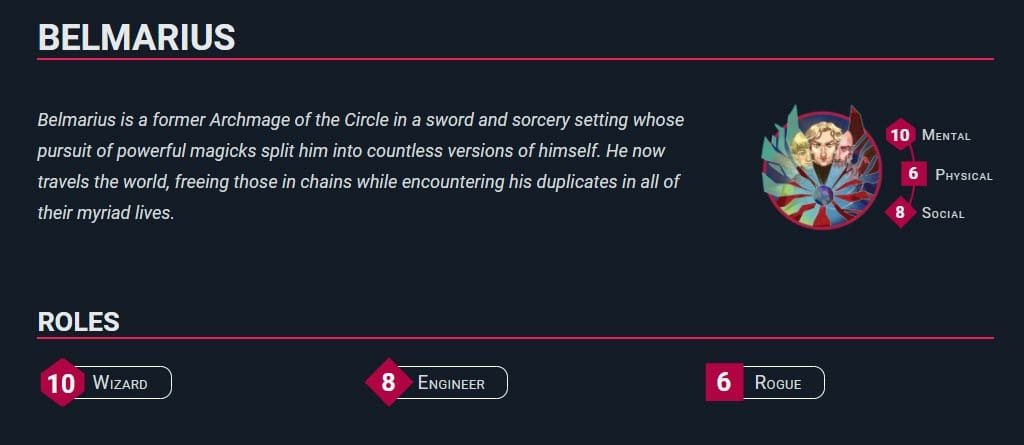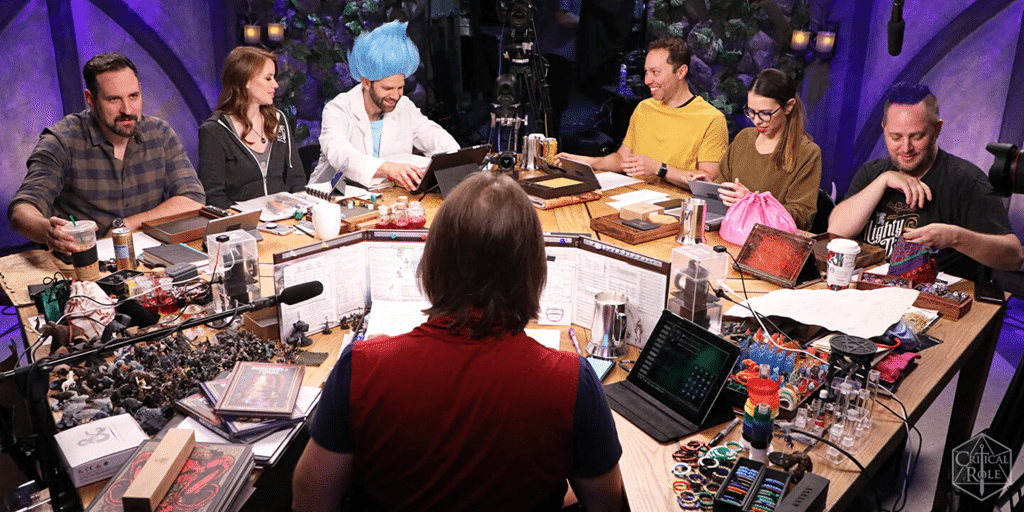Tabletop RPGs have long been considered the pinnacle of geekiness and nerdiness. And not in the good way. Most folks know the biggest TTRPG, Dungeons & Dragons, and that's about it. And because of a stereotype going back decades, once you've rolled initiative, you are somehow too geeky for everyone but the geekiest geeks who ever geeked a geek.
That is not true. With the popularity of streams like Critical Role and podcasts like The Adventure Zone, TTRPGs are moving away from being the whipping post of much of geekdom and into the spotlight they've deserved for 40+ years.
If you haven’t played tabletop RPGs before, you owe it to yourself to do so. They are fun, they are (or can be) cheap, and they teach critical thinking skills. Plus, they provide social interaction which these days, most of us are in dire need of.
First off, What are Tabletop RPGs?
A tabletop RPG (TTRPG) is a form of roleplaying game where players take on the role of a character, maybe an Orc Warlock searching for a magical artifact or a Unicorn Paladin who swore an oath to a rainbow god or even a Goblin Innkeeper-Turned-Bounty-Hunter. Whatever it is, players take on that role and describe what they want their characters to do.
Then they (probably) roll some dice, and based on the rules of the game, the Game Master (GM) decides how that moves the story forward.

The Game Master is a player responsible for describing and running the game and adjudicates the outcome of the action. (In the case of Dungeons & Dragons, that player is called the Dungeon Master and often referred to as the DM.) These players read the rulebooks, absorb them, and then choose which parts are the most fun for their players. The joke is that the GM/DM is the god of the table, and it's not far from the truth. What they say goes.
Except…when the players take the story into their own hands. Quite often TTRPG players surprise their GMs by not following the expected path. Because the players' decisions and actions shape the outcome and story of the game, if they say or do something unexpected, the GMs plans could go right out the window.
Tabletop RPGs are very much about collaborative storytelling, so that's a very real possibility in almost any game. Now, all of those unexpected actions are subject to the GM's approval, but most game masters are of the mindset that the players are running the game, and they are just moderating it.
TL;DR: tabletop RPGs are big games of pretend where everyone tells a story by rolling dice and doing math. But it's really a lot of fun. I promise.
There’s a TTRPG Genre for Everyone
There is a vast selection of RPGs. In fact, if you're a geek of pretty much any fandom, there is likely a TTRPG for the property, and definitely a system that can let you create your own version of it. (Personally, I am becoming fond of Cortex Prime for that sort of thing.)

Big Star Wars fan? Fantasy Flight's Edge of the Empire is a fantastic TTRPG. More of a Sword and Sorcery/High Fantasy kind of geek? There are boatloads of RPGs for you, from D&D to Dungeon World to Pathfinder and more. Comics and superheroes and the MCU more your speed? Marvel Heroic Roleplaying. Horror? Call of Cthulhu.
The list really could go on and on. And does. Just check out drivethrurpg.com. There are so many. Hundreds of different systems and themes and all kinds of tabletop RPGs. They can be as complex or simple as you want them to be. It's just delightful.
So Many Systems
On top of the myriad themes and genres available, there are also different game systems to select from. The game system provides the base rules framework for the game. In some games, you may use an ability where your character shoots an arrow at a goblin. You roll a couple dice and statistics on your character sheet tell you whether you hit or not and how much damage you do to it. In another game, you might simply describe what you're doing to the goblin, your reasons for doing it, and you might only roll a die to see to what degree you succeed or fail.
Some systems tend towards in-depth, tactical combat (like Dungeons & Dragons 4th Edition), while others focus more on plot, character development and co-operative storytelling (like Cortex Prime I mentioned above).
That’s not to say that you can’t have storytelling in a system that has a tactical combat focus. It just means the system's rules cater to a particular type of playstyle. Some systems have mechanics built in to encourage roleplaying. For example, Marvel Heroic Roleplaying’s Milestone system rewards players for accurately portraying their hero. D&D 5e has a feature called Inspiration that GMs can dole out to players who are particularly good at role-playing or advancing the story.
Stretch Those Imagination Muscles
For whatever reason, society has taught us that being an adult involves sacrificing your imagination on the altar of maturity. If someone enjoys imagining, they are presumed to be immature or insane. Yet the fact is that our imagination only dies if we let it.
Tabletop RPGs give you an outlet for this and a way to stretch these muscles. The descriptions of the scene and the action are yours to visualize. Many GMs use visual aids like maps and miniatures to bring players into the game, but they still don't entirely replace the imagination side of TTRPGs.
Plus, there's the actual roleplaying part of it. People can feel goofy when starting out doing this, and it can feel strange at first. You might feel self-conscious or silly. But honestly, tabletop RPGs are generally a safe space, and come on…I mean, we're all a bunch of nerds rolling dice and playing pretend.
If roleplaying is new or strange to you, just take it slow and look to the veterans in your group for examples. A lot of people get flustered when it comes to roleplay in RPGs, but I honestly look at it like this: we’re all bad at it and thankfully we never have to be critiqued. No one at your table is going to laugh at you (because we're all friends here) so go for it when you feel comfortable.

In a way, it's a bit like acting. Actually, it is acting. Which is why folks on Critical Role and other shows like that are so successful…they're professional voice actors. That's what they do. But most TTRPG players aren't professional actors. That doesn't mean you can't do this.
However, you also don't have to do this. Many people don't use character voices or physically act things out. But it's a part of the experience that can add to it if you let it. Combining both these elements can create unbelievable gaming sessions where you are so engrossed in the game that you lose track of time.
Homebrew and House Rules and Modified Systems
The game system provides a framework so that everyone is working under the same assumptions when it comes to things like combat, skills, and exploration. However, many RPG groups have custom rules called “house rules” or “homebrew rules” in place to further modify the system.
For example, when a friend was running a Dungeons & Dragons campaign, they gave each of player a custom feat that evolved as the story progressed. It was like an ability that leveled up as they did. That is certainly not in the Dungeon Master's Guide, but it sure is a cool way to play the game!
Along with house rules, a lot of game systems encourage improvisation. As I mentioned earlier, for the D&D Inspiration reward. For example, The Dresden Files RPG runs a modified version of the FATE system and allows players to spend a currency called “fate points.” They then get to basically fill in the blanks of a scene, among other things. For example, a player could spend a fate point to find something to take cover behind. Even if the GM hadn't specifically said there was something to take cover behind.
Personally, I’ve always been of the opinion that you should reward players for being intelligent and bold and like systems that have built-in rules for it. When one of my players wants to do something awesome, I encourage it. As long as it makes sense.
(Who am I kidding? Even if it doesn't make sense if it'll be funny or make for a good story.)
In addition to just modifying the game’s rule framework, you have the possibility of creating entire settings. Generally, the community calls them “homebrew worlds” or “homebrew settings.” Honestly, you should leave this alone until you're an experienced GM, but the idea of a custom world appeals to a lot of players and could result in a very unique and memorable playing experience.
TTRPGs are Social Games At Heart
There is something to be said about sitting down a table with your friends, breaking out the snacks and drinks and then rolling some dice together. It’s an experience that you need to try at least once. Unfortunately the COVID-19 pandemic has made that harder than it used to be. But with programs like Roll20, D&D Beyond, and Fantasy Grounds, using a virtual tabletop to gather with friends is an incredibly viable option.
While the social aspect applies to other games as well (like board games or online games or MMOs), it is still an important part of the tabletop RPG experience. Being a part of a group that's involved in telling a collaborative story is something special that you can't replicate in any other kind of game.
One of Us! One of Us!
The TTRPG community has long been one of the most helpful I’ve been a part of. Websites like EN World can keep you up to date on the community and industry at large, and folks like Matt Colville have entire YouTube channels dedicated to making you a better Game Master (or Dungeon Master in this case).
They offer great advice on GMing and world building, and they also review new products. Matt’s Patreon for MCDM even has a cool D&D magazine called Arcadia that is every bit as professional as anything put out by Wizards of the Coast.
Robust fan communities tend to spring up around each individual game system as well, offering advice on anything from rules adjudication to character development and optimization. Lots of these are on Reddit (r/BehindTheScreen being my favorite), but Twitter has a ton of hashtags that keep the tabletop RPG community connected.
Additionally, the tabletop RPG community is one of the most inclusive and welcoming communities out there. The fight for representation and against systemic racism (literally systemic in this case, as it's baked into the D&D rules). It's just all around fun to be a part of.
Go Forth and Play Tabletop RPGs!
If you’re looking to get into tabletop RPGs or a join a game but don’t have access to a group, you can use the internet to search for games near you. Roll20 has a looking-for-group feature, if you want a virtual game.
You could just ask your friends and see if they would be interested in starting up a game. Failing that, checking out your local hobby store is a good idea. A lot of these stores have weekly games (maybe through the D&D Adventurers League), or they may be able to point you in the right direction in terms of finding you a game. Heck, I've seen TTRPG groups get started on Meetup.com.
Hopefully, that gave you a bit of a look into how awesome tabletop RPGs are. Maybe we can even sling dice together sometime! Games are always getting put together on the Geek to Geek Discord, so hop on in our #tabletop-gaming channel and see what's up.


There are so many systems! I love Vampire the Masquerade and Call of Cthulhu
My friends in college LOOOOOOVED Vampire the Masquerade. I never had a chance to play it or any of the White Wolf/World of Darkness games. I need to fix that some time.
[…] good DM really sets the scene and describes what's going on. After all, this is a TTRPG, and all anyone can see is what you put in front of them, figuratively or literally with maps and […]